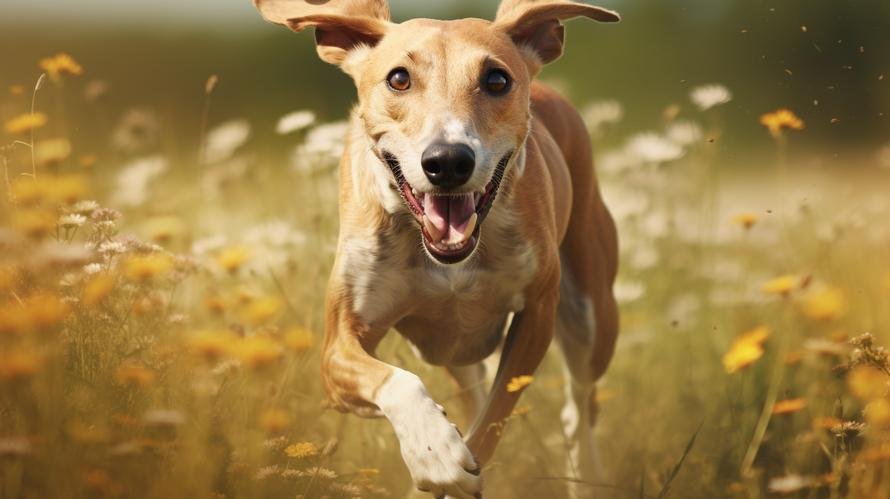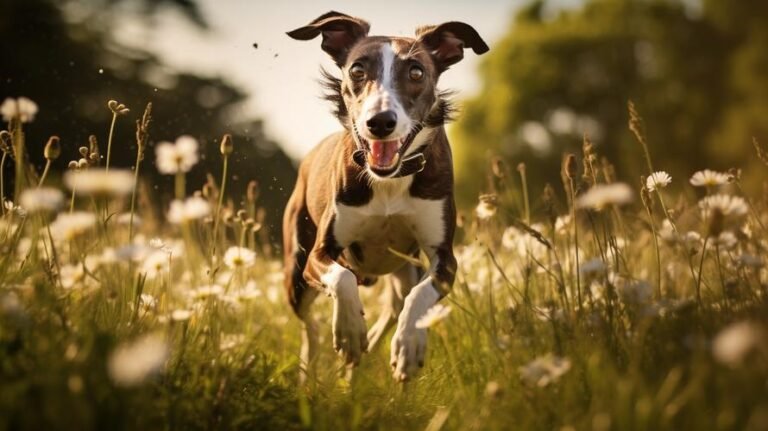Picture this: a sleek, athletic dog, muscles rippling under a short, smooth coat as it sprints with the speed of a race car, its focus unwavering. That’s the image most people conjure up when they think of a Greyhound. Known for their lightning-fast speed and racing accolade, these dogs seem to embody the very essence of agility and sportsmanship. But what about when the race is over and the tracks are behind them? Could the same Greyhound that was celebrated for its pace be your stalwart protector, standing guard over your home? It’s quite the thought, isn’t it?
Many would be surprised to learn that Greyhounds have a history that stretches far beyond the racetrack. In fact, their lineage can be traced back over 4,000 years, to the ancient tombs of Egypt where depictions of slim, sleek dogs have been discovered alongside pharaohs. Known as the “Greyhound” for the first time in the Middle Ages, the etymology of their name is still up for debate, some arguing it’s derived from the Old English “grighund,” where “hund” means dog. Yet, “grey” is a bit of a mystery – is it a reference to color, or does it stem from an old word meaning “fair” or “fine”? Either way, these dogs were so revered for their hunting prowess that they were the only dogs allowed to be owned by nobility in England during certain periods.
Hailed for their incredible hunting skills, Greyhounds were the nobleman’s dog of choice when it came to the pursuit of game. Their keen eyesight, unmatched speed, and swift decision-making skills made them formidable hunters. This unique set of skills does confer some characteristics that could be beneficial for guard dog duty. However, that’s not the full story.
When we consider the traditional role of a guard dog, we think of a dog that is alert, territorial, and protective — traits that are commonly associated with breeds like German Shepherds, Rottweilers, and Dobermans. So how does the genteel Greyhound compare?
Firstly, Greyhounds are, by nature, gentle and even-tempered. They often shy away from aggressive confrontations and would much rather relax at your feet than stand sentinel at your door. Their mellow disposition doesn’t exactly scream “fierce protector,” but it does make them fantastic companions.
But let’s dive deeper into their psyche. Due to their racing backgrounds, Greyhounds are trained to be chasing machines. They are sighthounds, which means they rely heavily on their vision to spot and chase down prey. They are exceptionally good at this. So, if your idea of a guard dog is one that will alert you to a squirrel across the yard, a Greyhound has you covered. An intruder, though? They might not be as invested.
One defining characteristic of Greyhounds is their sensitivity. They are extremely in tune with their surroundings and can pick up on subtleties in their environment or even your mood. This sensitivity should not be mistaken for nervousness; rather, it’s a sign of their intelligence and adaptability.
Another possible watch-guard trait is their reservedness with strangers. Greyhounds aren’t usually the type to bound up to new people with tail wagging. They tend to hold back, assessing newcomers with a careful eye. While this could lend itself to guard dog behavior, more often than not, with proper socialization, they’ll greet a stranger the same way they’d greet an old friend – with polite interest, perhaps a nuzzle, but rarely with hostility.
In a family setting, Greyhounds can be incredibly loyal and affectionate with their humans, especially if they are adopted post-race. Their competitive days behind them, they value the comfort and love of home far more than the thrill of the chase. Rather than be your guard, they are more likely to seek your protection and company. They revel in soft beds — perhaps more than defending them.
Now, you could be wondering about the physical attributes of Greyhounds that could possibly make them guard dogs. Let’s explore that. They have a lithe, powerful build and can reach speeds up to 45 miles per hour, making them the Ferraris of the dog world. If they decided to chase off an intruder, it’s unlikely the perpetrator would get far. But herein lies the catch: a Greyhound needs to be motivated to chase. The average burglar isn’t rabbit-shaped and won’t typically bring out that hardwired chase instinct.
The reality is that while the Greyhound is capable of bursts of superhero-like speed, its favorite pastime is lounging — often described as a “45-mph couch potato.” They enjoy short spurts of exercise followed by long periods of rest, often sprawled in the most comical positions. They’re not the type to pace your perimeter tirelessly throughout the night. Their speed is reserved for special occasions, not the daily duties of guarding.
And what about barking? Surely a guard dog must have an imposing bark. Greyhounds can indeed bark, but they often don’t. They’re a relatively quiet breed, only barking when it seems necessary to them, which may not coincide with the moments you’d expect them to sound the alarm.
Let’s also consider the training aspect. Greyhounds are intelligent and can be trained to a certain degree, but their independent nature means that they may not always see the point of the repetitive training that might be required to instill guard dog behaviors. They learn quickly, though, so if you can make it worth their while, they’ll happily engage — at least until naptime.
So, is the Greyhound a guard dog? The short answer is no. They were bred for speed, not protection. However, they are observant and might alert you to something amiss. In the end, their temperament leans towards sweet-natured and friendly rather than vigilant and aggressive. That said, if an unassuming presence, capable of incredible reaction speeds, yet more inclined to charm than to guard, sounds like the perfect fit for your home, then maybe your Greyhound will guard your heart, if not your house.
In conclusion, if you’re looking for a loyal, loving companion with a rich historical background, look no further than the Greyhound. But if it’s a dedicated guard dog you seek, you’d be wise to consider other breeds more suited to the task. The Greyhound will win your heart with its grace and affection, but it’s unlikely to ward off anything except perhaps the cold, by cuddling up close on long winter nights.



